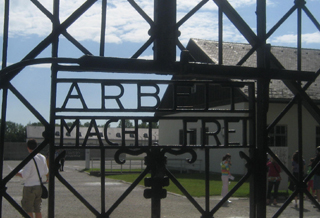 It was hard to believe that we were getting ready to spend our last day together in Europe when we got up on the morning of Saturday, July 19, 2008 in Munich, Germany. In one sense, it had seemed like we had been here forever, seeing so many things and visiting so many places. But on the other hand, it was hard to believe that my two-week journey was drawing to a close. We had a lot to see this day, so we got up and moving relatively early. There was no breakfast at the Renaissance Munich Hotel where we were staying, a first in Europe. We jumped into our rental and headed out for our first destination of the day: the Olympic Park.
It was hard to believe that we were getting ready to spend our last day together in Europe when we got up on the morning of Saturday, July 19, 2008 in Munich, Germany. In one sense, it had seemed like we had been here forever, seeing so many things and visiting so many places. But on the other hand, it was hard to believe that my two-week journey was drawing to a close. We had a lot to see this day, so we got up and moving relatively early. There was no breakfast at the Renaissance Munich Hotel where we were staying, a first in Europe. We jumped into our rental and headed out for our first destination of the day: the Olympic Park.
The Olympic Park (or as it is known locally, Olympiapark) was virtually abandoned at this early hour, so after finding a place to park, we just took a brisk walk through the location where the 1972 Summer Olympics were held. The park is still used today for a variety of events. There wasn’t a whole lot to see here, as all of the buildings were closed – so it was more of an “I was there” moment. We took a long walk to get to the main stadium, only to find that it was closed off by a fence. The communication tower that was erected to transmit the televised Olympics was quite impressive though. And leave it me to find a Big Seven connection.
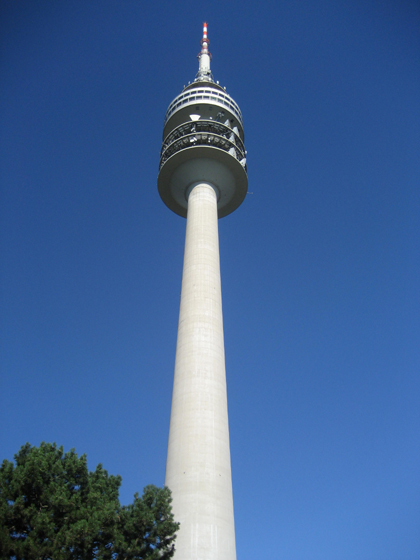
The impressive communication tower on a blue, clear day
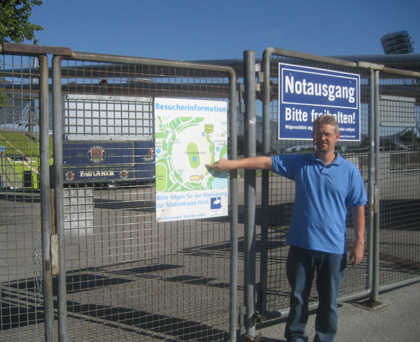
In front of the Olympic Stadium
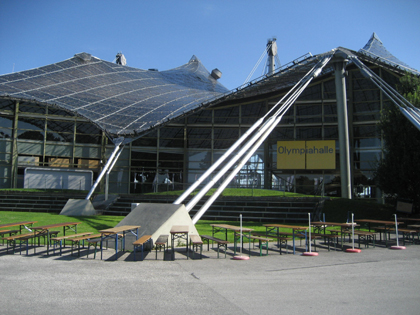
Olympiahalle where the gymnastics and handball event took place during the 1972 Olympics
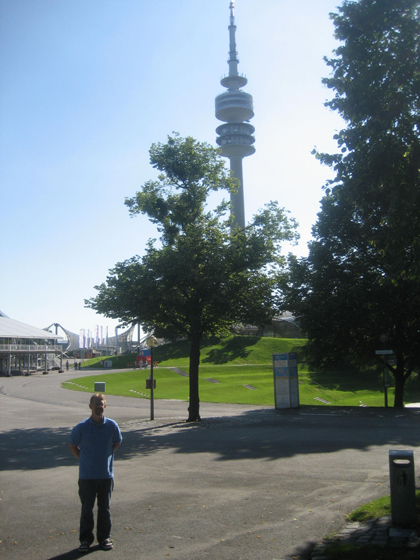
Me and the tower
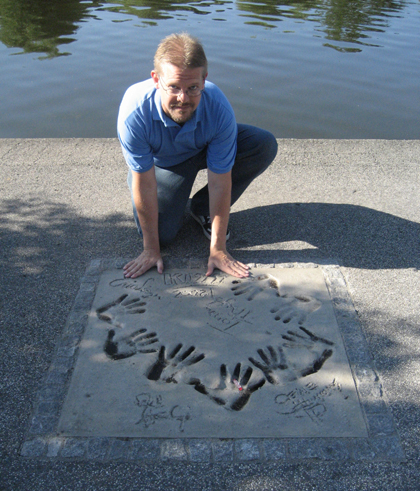
KISS handprints on the Munich Olympic Walk of Stars
It took as while to find the correct path back to our car, but we walked it quickly, knowing that there was a lot on our agenda for our last day. We headed out, driving by the famous BMW building (as seen in the film Rollerball in 1975). About 45 minutes later, we had arrived at our next historical location: the concentration camps in Dachau.
From almost the moment that we stepped through the gates of this site, I was dreading having to write about it on this website. Simply because it is difficult to describe the feelings of dread, disgust, sadness, fascination, nausea, pity, and anger that I experienced while walking through it. And it is difficult to come to terms as to how God could have let the atrocities that went on inside these walls take place.
Dachau was the first concentration camp opened by the Nazis and served as the prototype for the camps that would soon follow. This was opened in March of 1933 as a place for “political prisoners” to be imprisoned. In total, over 200,000 prisoners were housed here, of which one-third of them were Jews. The death count at this camp was 25,613, most of whom died from disease, malnutrition, and suicide. But it is the individual stories of murder, starvation, prostitution, rape, abuse, and medical experiments that really stayed with and haunted me.
The day was lovely and warm, with bright blue skies, and the sun beating down on us – which seemed to make the whole experience even more stomach-churning. To look up and see the same sun beating down on me in this location as the one that I see in my own neighborhood of middle-class domestic life was a bastardization of every God-given right to freedom that I have ever felt.
When I first approached the gates, I had Jimmy take a photo of me in front of the sign which read “Arbeit Macht Frei.” This translates as Work will make you free. Every prisoner who passed through this gate read this lie and believed that by working hard for the Nazi government, they would be treated humanely and then achieve freedom. Inside the gates I had Jimmy take a photo of me in front of the side of the Memorial which stands on the grounds.
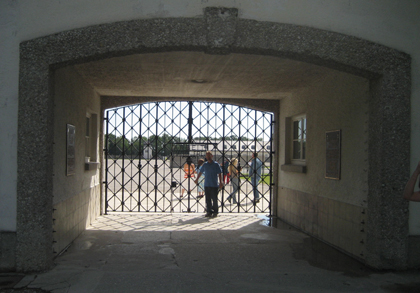
At the entrance to Dachau
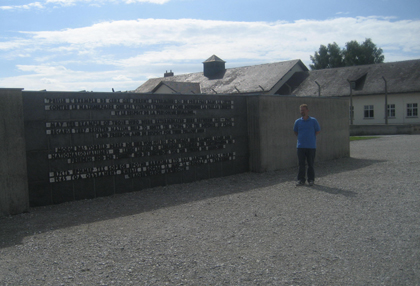
Side of the monument which reads in four languages “May the example of those who were exterminated here between 1933-1945 because they resisted Nazism help to unite the living for the defence of peace and freedom and in respect for their fellow men”
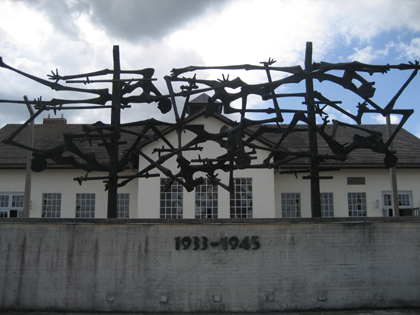
Front of the Memorial with the maintenance building, now the museum, behind
But once I began to explore the area, in particular the mammoth museum that was located inside the former maintenance building, I decided I didn’t want to be in any more pictures taken here. In fact, I chose to walk the museum and grounds by myself, not wanting to discuss it or share the experience with anyone else.
The museum had anything and everything relating to Dachau and the history of the Nazis, the persecution of the Jewish people, and World War II. This building was one of the few that remained intact on the grounds. All of the barracks in which the prisoners were stuffed into bunk beds had been destroyed, but one representative building had been reconstructed to show the living conditions.
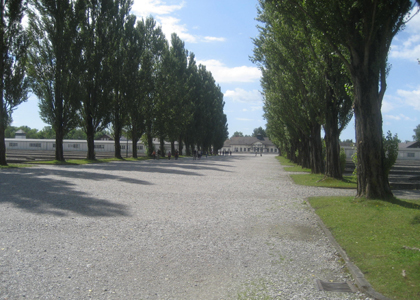
The long path between the maintenance building and the crematorium
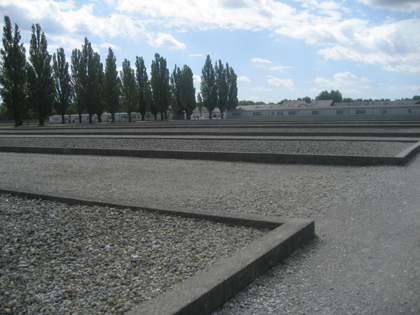
The sites of the former barracks along the way
The two crematoriums in the camp were particularly nauseating. The first was built in 1940 when the mortality rate began to escalate out of control. It is estimated that 11,000 prisoners were cremated within its walls. Executions were also carried out here, directly in front of the burning ovens. A second, larger crematorium was built in 1942. This one also contained gas chambers where the Nazi SS murdered individuals and small groups (survivors testified that no mass murders took place in these particular gas chambers).
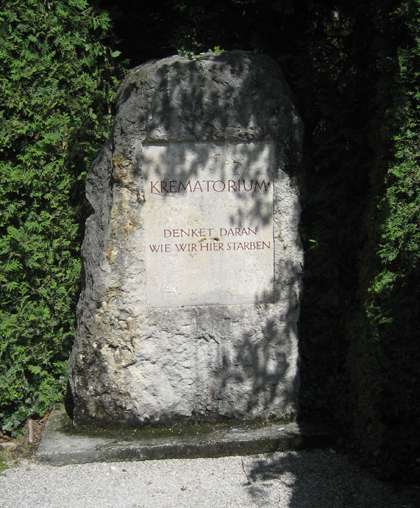
Modern day monument indicates the crematorium. Translated the inscription reads “Think about how we died here”
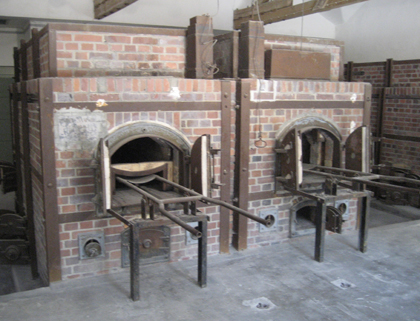
Ovens would hold four to five bodies. Hangings took place in front of them.
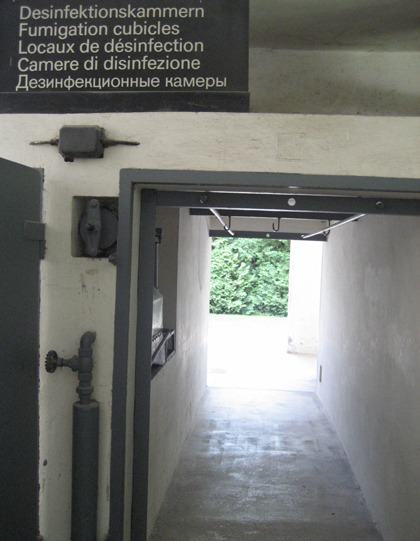
The gas chamber
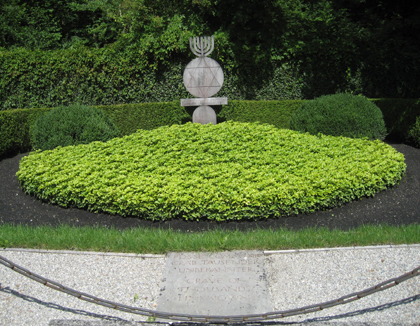
“Grave of Thousands Unknown”
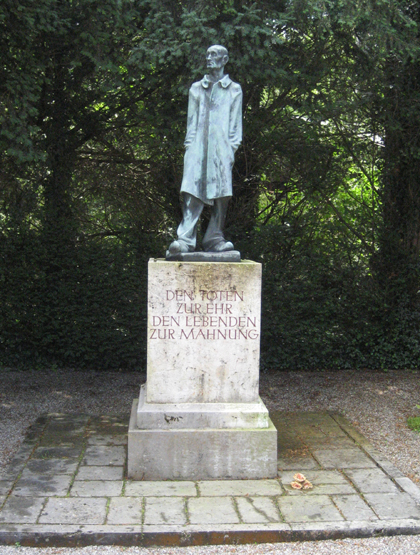
And memorial
On April 29, 1945, the Dachau concentration camp was liberated by American troops, freeing 32,000 prisoners. 300 SS camp guards were executed on the spot.
The Wileys and I had roamed the camp separately, but met up midway and determined when we would leave (I was afraid that I wouldn’t find them on time, but was too enraptured in the exhibits to do anything about it). We agreed to meet up about 11:30am which was later than Jimmy thought we needed to be on the road. And it almost proved to be a disastrous decision.
We had all been moved and saddened by the Anne Frank house earlier in the trip. While that experience put one unique individual into the face of the horrible persecution of the Jews, this one drove home the magnitude of it. We all agreed that the experience at Dachau was very disturbing, but it was necessary to see. Not only to appreciate the lives that were lost there, but to understand what we were fighting during the war, and to relish the freedoms and life that we have been given. Fortunately, this wasn’t my last memory of Europe. The day would get much lighter…I promise.
The European vacation will continue…
Leave a Reply